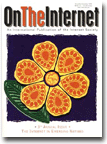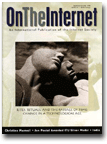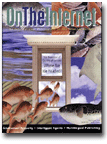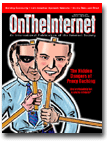e-OTI/OnTheInternet Archives
All articles from e-OTI are available from the archives. Selected articles from previously-issued
printed editions are also available. Complete printed back issues
are available from the ISOC Store.
 |
|
November/December 1998
Visible Women
By Wendy Rickard
Globally, women produce more than half the food that is grown;
yet they own only about 2 percent of all land, a fact that helps
keep women in many regions of the world poor. A few organizations
are using the Internet to help educate women to become leaders.
The results may offer a stunning model of the Internet as a crucial
element in the quest for economic equality.
Silicon Valley 2: Is HigherTechnology’s Future Heading South?
By Madanmohan Rao
Like many so-called emerging nations, India’s Internet economy
is stunted by inadequate infrastructure and lack of progressive
political will regarding Internet policies. But change is imminent.
Citing examples gleaned from the recent India Internet World conference
in New Dehli, the author explains how India could be the industry’s
next Silicon Valley.
Food, Farming, and Women’s Leadership in Africa: Using Electronic
Communications and Training to Change Perceptions and Realities
By Sarah Tisch and Ken Herman
Often times, the largest obstacle to progress--be it economic,
social, political, or physical--is a lack of access to information
and resources. Winrock International, a nonprofit, nonsectarian
organization dedicated to reducing poverty and hunger through
sustainable agriculture, natural resource management, and renewable
energy, is not just addressing that problem. They’re solving it.
|
|
 |
|
September/October 1998
Rites, Rituals, and the Passage of Time: Change in a Technological
Age (English) (Spanish)
By Llorenç Valverde
Symbols, rites, and rituals are signs of identity, and they preside
over the constant process of transition from what we were yesterday
to what we will be tomorrow. Today new information and communications
technologies are not only causing change; they are examples of
our reaction to things as they are. The author argues that not
only do we misconstrue tradition by clinging to what is obsolete,
but that technology is in fact an indispensable ally of culture.
Maxwell’s Silver Hammer: The Irresistible, Irrepressible Christine
Maxwell
By Mark Stokes
As cocreator of the McKinley Group and the Magellan online directory
and search engine, Christine Maxwell is used to thinking outside
the box. OTI contributing editor Mark Stokes talked to Maxwell
about her views on content, Internet publishing, women in cyberspace,
her famous publishing-magnate father, and what she has planned
for the future.
The Internet Is Everything--and Other Dramatic Overstatements
By Wendy Rickard
Today we are on the cusp of major new developments in both the
technical and policy aspects of the Internet--which explains why
it is so difficult to avoid hyperbole when discussing it. From
the domain-naming system to copyrights, to censorship, the issues
are hot and the stakes are high. The bottom line? Expect the Internet--and
the drama--to continue.
|
|
 |
|
July/August 1998
The Evolution of Quality of Service: Where Are We Heading?
By Paul Ferguson and Geoff Huston
Now that the Internet has moved from research project to full-fledged
business activity, it’s hard to dismiss the poor service quality
that is frequently experienced. Two leading experts detail the
metrics of service quality and spell out their strategies to improve
the flow of traffic.
Creating Brand Identity on the Internet
By Arthur Goldstuck
Corporations invest huge sums of money creating brand identity
in the marketplace only to find that things aren’t the same in
cyberspace. The author points out the more common mistakes big-name
companies make when trying to leverage their brands on the Net.
When a Village Ceases to Be a Community
By Prof. Wayne Spivak
A community -- even an Internet community -- is more than just
a mailing list, a discussion group, or a set of shared beliefs
or interests. It must conform to some kind of structure.
Ask Correctly and Ye Shall Receive
By Wendy Rickard
Search technology not only cuts to the core of Internet functionality,
it also enables us to explore how the nature of our relationship
with information is changing and, in some cases, being formed.
Multilingual Publishing on the Asia-Pacific Internet
By Madanmohan Rao
With the percentage of U.S. Internet users as a percentage of
worldwide users dropping, the proportion of non-U.S., non-English-speaking
Internet users is growing. With many experts betting that content
will be the next big Internet driver, companies in the United
States and abroad are now venturing into multilingual Web publishing.
|
|
 |
|
January/February 1998
Is the Internet Heading for a Cache Crunch?
By Russell Baird Tewksbury
In an effort to provide more efficient bandwidth and server utilization
to customers, network administrators are turning to proxy caching,
a technology that relies on the creation of digital duplicates
or clones of original Web pages. Can content abuse be far behind?
Art and Culture on the World Wide Web: From the Control of Content
to the End of Art
By Niranjan Rajah
The genius of TCP/IP extends far beyond the ability to relay data
from one point to another. It also means the free flow of creatively
rich, technology-inspired content that is changing the way we
think about art, media, literature, and the roles of audience
and creator.
Sound Bites and Document Bites versus Electronic Message Bytes: A Comparison of the Intrinsic Security of Media for Credit Card
Transactions
By Lloyd Conklin
When it comes to Internet security, both popular opinion and hard
facts support the age-old adage, we have nothing to fear but fear
itself.
Why Mongolia?
By Geoff Long
From no Internet access in 1994 to an Internet conference host
country in 1997 -- discover how this developing country was able
to make such giant strides in so little time.
Building Community One Byte at a Time
By Janet Perry
From Howard Reingold’s Virtual Community to the recently published
bestseller, net.gain, the Internet has long been valued for its
community-building capabilities. But does the evidence support
the claim?
On the Web—and Blind
By Dan Jellinek
For the blind and visually impaired, surfing the Web can be an
endless source of anxiety and confusion.
|
|

